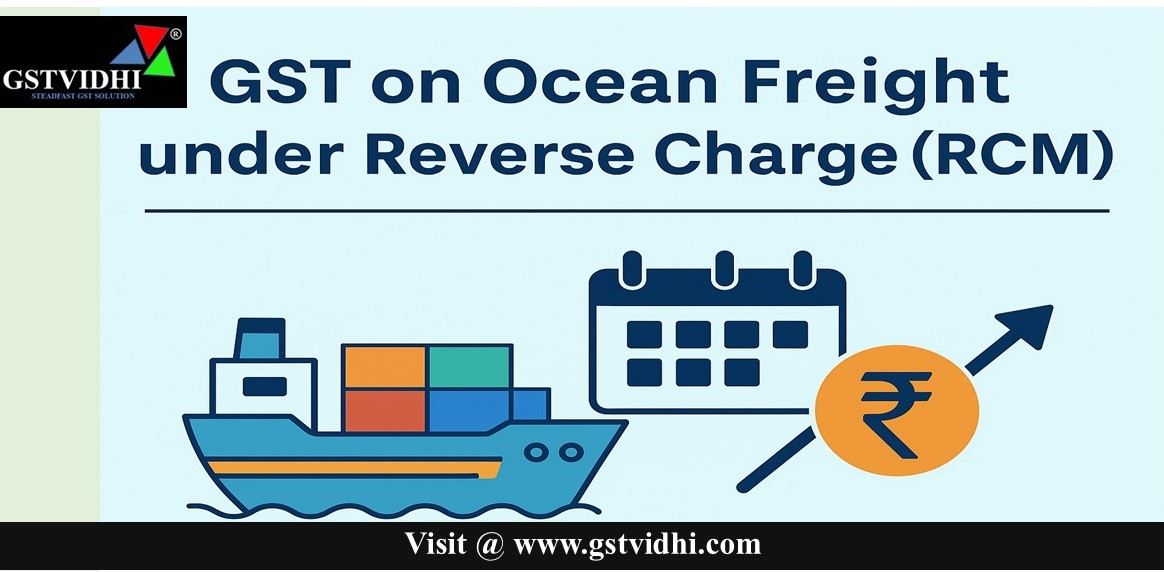
RCM on Ocean Freight / GST on Ocean Freight under Reverse Charge
(RCM) / Ocean Freight
Introduction:
What is Ocean Freight? International trade has grown a lot
because of globalization. Today, a huge portion of India's trade — around 95%
by volume — happens through ships. When goods are transported via sea, the
amount paid to the shipping company is called Ocean Freight. Because
this freight is a service, it comes under the purview of GST (Goods and
Services Tax). However, in the case of ocean freight, there are special
rules where sometimes the importer, not the shipping company, pays
the GST. This concept is called Reverse Charge Mechanism (RCM).
Meaning of
Ocean Freight
Ocean Freight
means the money paid to a shipping line for transporting goods across the sea. Shipping
lines are companies that operate ships for moving cargo from one country to
another. These companies may be based inside or outside India.
Understanding
GST on Ocean Freight
In normal situations, the
supplier of goods or services collects GST and deposits it to the government. However,
in case of ocean freight, depending on who arranges the transport (exporter or
importer) and who owns the shipping line (foreign or Indian), the GST
responsibility changes.
There are two key terms
you must understand for this: CIF and FOB contracts
CIF vs FOB
Contracts in Imports
When you import goods,
the delivery terms define who is responsible for transportation.
Two commonly used delivery terms are CIF and FOB.
What is CIF
(Cost, Insurance and Freight)?
Under a CIF contract,
the foreign exporter is responsible for:
- Arranging the shipment,
- Paying for transportation,
- Getting the goods insured.
The seller provides a single
invoice that covers the cost of goods, insurance, and freight.
Since both the exporter
and the shipping line are located outside India, under Indian GST law,
these services are considered to have occurred outside the taxable territory.
Thus, there is no GST applicable under Reverse Charge for CIF imports
after recent legal changes.
Important Note: Before
01.10.2023, importers were required to pay GST under Reverse Charge even
for CIF contracts. But after Notification No. 13/2023 – IT (Rate), this
requirement was removed.
What is FOB
(Free on Board)?
In an FOB contract,
the exporter is responsible only till the goods are loaded onto the ship in
their country. After that, the Indian importer becomes responsible for:
- Arranging transportation,
- Taking insurance,
- Paying freight charges.
Depending on who operates
the shipping line, GST treatment differs:
- If an Indian shipping line is
used, GST is charged under Forward Charge (normal method).
- If a foreign shipping line is
used, GST must be paid by the importer under Reverse Charge.
Summary
Table for Quick Understanding
|
Basis
of Comparison
|
CIF
Contract
|
FOB
Contract
|
|
Responsibility
for Shipping
|
Exporter
|
Importer
|
|
Who
arranges shipping?
|
Exporter
|
Importer
|
|
GST
under Reverse Charge?
|
❌ No (after 01.10.2023)
|
✅ Yes (if foreign
shipping line)
|
|
GST
under Forward Charge?
|
❌ No
|
✅ Yes (if Indian
shipping line)
|
How GST
Applies: Situation Wise
Let's break it down with
simple explanations:
- CIF Imports:
No GST under reverse charge now. The exporter handles shipping and freight
charges.
- FOB Imports using Foreign Shipping
Line: Importer must pay GST under Reverse Charge as
it is treated as Import of Service.
- FOB Imports using Indian Shipping
Line: The shipping company itself will add GST to its
invoice and collect it directly from the importer under Forward Charge.
Major Change after
01.10.2023: Previously, even if the importer had no
separate contract with the shipping line (under CIF), they still had to pay GST
under Reverse Charge. However, after the new notification effective from October
1, 2023, GST is no longer applicable on CIF imports, making life easier for
Indian importers.
Practical
Examples for Better Clarity
Example 1: ABC
Ltd. imports industrial machines from Germany under CIF terms. The German
supplier arranges everything and provides one invoice.
Result:
ABC Ltd. does not need to pay GST on ocean freight under Reverse Charge.
Example 2: XYZ
Pvt. Ltd. imports chemicals from China under FOB terms and hires a foreign
shipping company.
Result:
XYZ Pvt. Ltd. must pay GST under Reverse Charge on the ocean freight.
Example 3: PQR
Industries imports goods under FOB terms but hires an Indian shipping company.
Result:
The Indian shipping company will charge GST directly in its invoice.

Conclusion:
Ocean freight plays a
vital role in India's international trade, and understanding its GST treatment
is very important for importers. The government has made it simpler by removing
Reverse Charge on CIF imports after October 2023. However, importers must still
be cautious while dealing with FOB contracts, especially when engaging foreign
shipping lines.
A clear understanding of whether
the contract is CIF or FOB, and whether the shipping line is foreign or
Indian, is crucial to avoid compliance issues under GST.
Disclaimer: All the Information is based on the notification, circular and order issued by the Govt. authority and judgement delivered by the court or the authority information is strictly for educational purposes and on the basis of our best understanding of laws & not binding on anyone.
Find the Attachment (Press on Click Here )
Click here